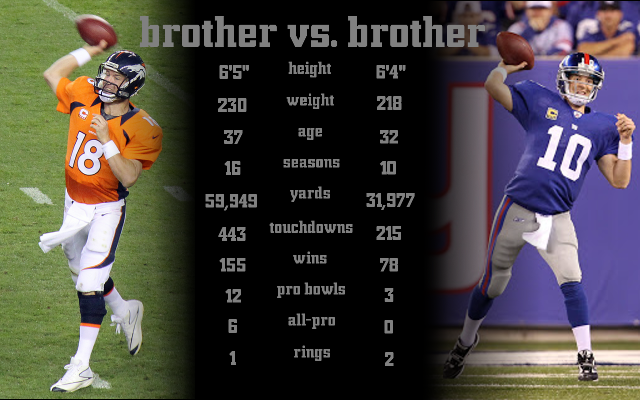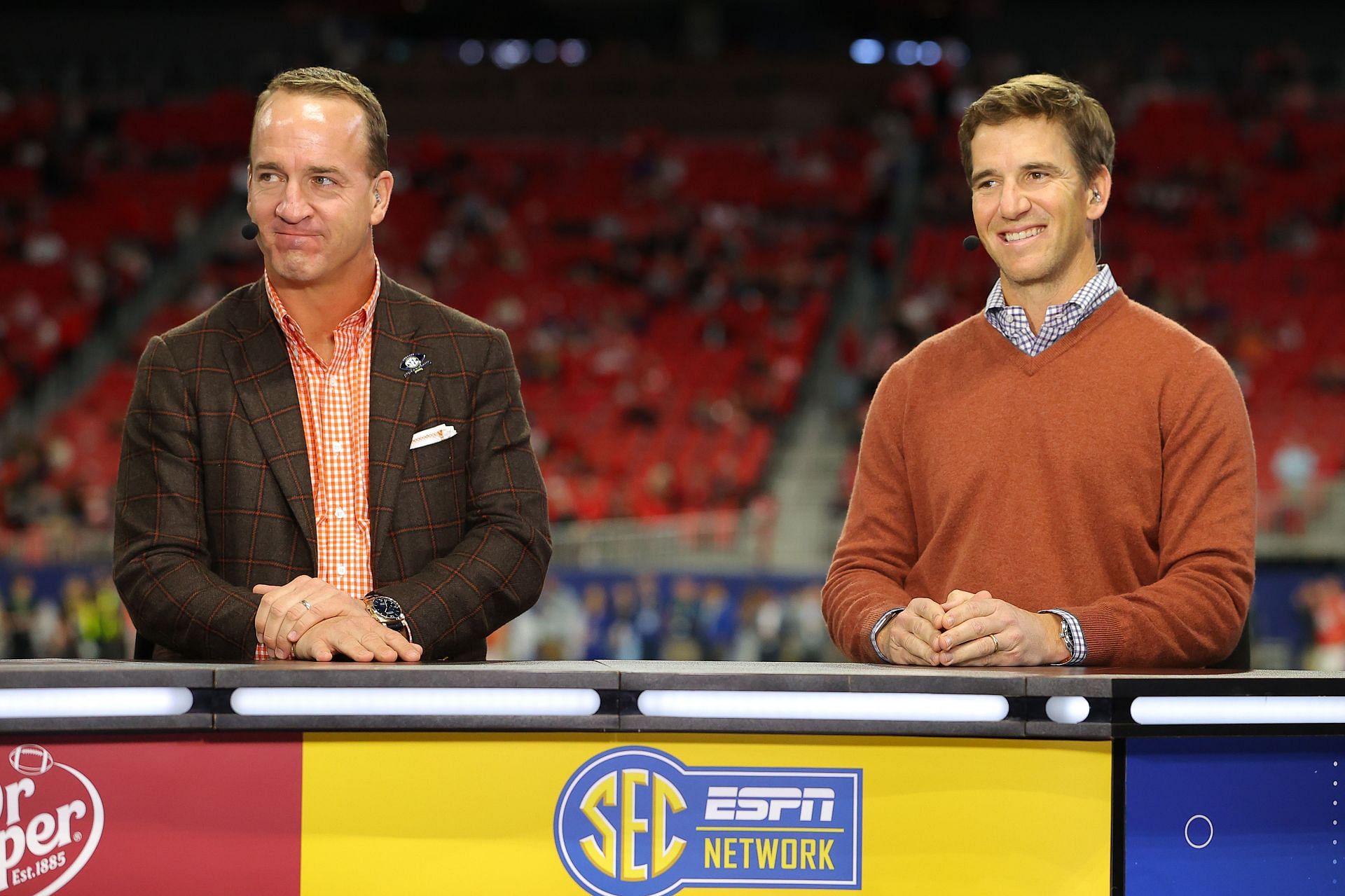For many football fans, the question of who stands taller between Eli and Peyton Manning, especially when we look at their career numbers, is a discussion that still sparks a lot of talk. These two brothers, both famous for playing quarterback, had incredibly successful careers in the NFL, gathering many honors and awards. They each brought a special kind of skill to the field, and their games, you know, were always a sight to see.
The debate often goes beyond just the raw numbers, reaching into how they played under pressure or what their teams were like around them. People remember the big plays, the tough wins, and the moments that really mattered. So, it's not just about who threw for more yards or touchdowns, but also about the stories their stats tell, and what those numbers meant for their teams.
When you really get into it, comparing Eli and Peyton is a fascinating exercise. It lets us appreciate their individual talents and the unique paths they carved out in the sport. We'll look at the figures, the big game moments, and what the data from "My text" suggests about their time on the field. It’s a chance to consider their achievements and perhaps, in a way, settle some of those friendly arguments about which brother had the statistically better run.
Table of Contents
- The Manning Brothers: A Quick Look
- Regular Season Performance: A Statistical Breakdown
- Playoff Prowess and Super Bowl Glory
- The Impact Beyond the Numbers
- Frequently Asked Questions
- What Do the Numbers Really Say?
The Manning Brothers: A Quick Look
Before we get into the detailed comparisons, it's good to have a quick overview of each brother's career. Both Eli and Peyton, you know, played a lot of games and made a big mark on the NFL. They followed their father's path, Archie Manning, who also played quarterback. Here’s a brief look at some general career points for each of them, just so we have a starting point.
Peyton Manning, for instance, played for a very long time, appearing in 266 games. His career was marked by incredible consistency and a knack for making plays happen. Eli Manning, on the other hand, played 236 games, and he was, in a way, often seen as the quieter of the two while on the field, though he found his own voice after stepping away from the game. These numbers give us a general idea of their longevity in the sport, which is, you know, pretty impressive for both.
Here’s a quick glance at some of their basic career statistics, pulled from "My text", so you can see them side by side. This really helps to set the stage for a more detailed comparison of their statistical achievements. It's interesting, too, how these basic numbers sometimes tell a story of their own.
| Name | Games Played (GP) | Passing Yards | Touchdowns (TD) | Interceptions (INT) | Passer Rating (RTG) |
|---|---|---|---|---|---|
| Peyton Manning | 266 | 71,940 | 539 | 251 | 96.5 |
| Eli Manning | 236 | 57,023 | 366 | 244 | 84.1 |
Regular Season Performance: A Statistical Breakdown
When we look at the regular season, there are some clear differences in the statistics between Eli and Peyton. Peyton, for example, played more games, and that really shows up in his overall career totals. He put up some very big numbers, which, you know, many quarterbacks could only dream of reaching. Eli also had a long and productive career, but his totals are naturally a bit lower because of the difference in games played. It's interesting, too, how their styles influenced these numbers.
Peyton Manning’s career numbers, as shown in "My text", are truly something to behold. He played 266 games, throwing for 71,940 yards. That's a huge amount of yardage, clearly putting him among the top passers in the history of the game. He also tossed 539 touchdowns during his career, which is a very high mark. His interception total was 251. These figures speak to his incredible volume and consistency over a very long period, basically defining an era for his position.
Eli Manning, on the other hand, played in 236 games. He accumulated 57,023 passing yards and threw for 366 touchdowns. His interception count was 244. While these numbers are lower than Peyton's, they are still, in a way, very respectable career totals for an NFL quarterback. It shows that Eli was also a very durable and productive player for a long time, leading his team for many seasons. The sheer volume of his work is, you know, quite notable.
Total Passing Yards and Touchdowns
Let's talk about passing yards and touchdowns, as these are often the first things people look at when comparing quarterbacks. Peyton Manning’s 71,940 passing yards are, honestly, just a massive figure. It reflects his ability to move the ball down the field consistently, season after season. His 539 touchdowns also show how often he was able to finish drives with points. These numbers are, you know, pretty much at the top tier for any player in history.
Eli Manning’s 57,023 passing yards and 366 touchdowns are, by any measure, very good career totals. While they don't quite match Peyton's record-setting pace, they still place Eli among many of the game's respected passers. It’s a testament to his longevity and his consistent ability to keep his team in games and score points. You know, to put up those kinds of numbers for so many years, that takes a lot of skill and dedication.
The difference in these totals, you know, is partly due to Peyton playing more games. But it also reflects, in some respects, their different roles and offensive schemes they played in. Peyton's offenses were often, basically, designed to maximize his passing production, and he truly delivered on that. Eli, meanwhile, often found ways to win games, even if the raw passing numbers weren't always as high. It's a bit like comparing two different kinds of very effective tools.
Interceptions and Efficiency
Interceptions are a big part of the quarterback story, too. Peyton Manning threw 251 interceptions over his career. Eli Manning threw 244 interceptions. So, while Peyton had many more touchdowns and yards, his interception count is only slightly higher than Eli's, even though he played more games. This is, you know, a pretty interesting point when you think about it.
When we look at efficiency, "My text" gives us some percentages. Peyton's touchdown percentage on pass attempts was 4.5%, and his interception rate was 3.0%. Eli's numbers are quite similar: his touchdown percentage was also 4.5%, and his interception rate was 3.0%. This suggests that, in terms of how often they threw a touchdown or an interception per pass attempt, they were actually very much alike. It's, you know, a pretty surprising detail when you first see it.
This kind of statistical similarity in efficiency rates, honestly, might surprise some people who assume one brother was much more careful with the ball than the other. It shows that both quarterbacks, in a way, had a similar risk-reward profile when they threw the football. They both took chances, but they also made big plays. It’s not just about the raw totals, but how often those events happened, which, you know, is really what these percentages tell us.
Quarterback Rating and Sacks
The passer rating is a way to get a single number that tries to capture overall passing performance. Peyton Manning had a career passer rating of 96.5. This is, you know, a very strong number, reflecting his high level of play throughout his time in the league. It accounts for completions, yards, touchdowns, and interceptions, giving a pretty good picture of his general effectiveness.
Eli Manning’s career passer rating was 84.1. This is a lower figure than Peyton's, and it suggests that, overall, Peyton was more efficient in his passing game during the regular season. This difference in passer rating is, frankly, one of the clearer statistical points where Peyton shows a significant lead. It’s a pretty standard metric, and it often points to how well a quarterback is performing on a play-by-play basis.
Another stat mentioned in "My text" is sacks. Peyton Manning was driven back 2,466 yards from sacks. The text doesn't give a sack yardage for Eli, but it does show that quarterbacks can lose a lot of yardage when they get tackled behind the line of scrimmage. This stat, you know, can reflect offensive line play, but also a quarterback's ability to get rid of the ball quickly. It's just another piece of the puzzle when you're looking at their overall statistical picture.
Playoff Prowess and Super Bowl Glory
While regular season stats are one thing, many fans feel that playoff performance is where a quarterback's true worth shines. This is where the stakes are highest, and the pressure is, you know, absolutely immense. Both Eli and Peyton had some very memorable playoff runs, and they both managed to win the biggest prize in football: the Super Bowl. Their paths to championship glory, though, had some pretty distinct characteristics.
The "Manning Bowl" games, when the brothers played against each other, were always a big deal, drawing a lot of attention. But it's their individual playoff performances that really get people talking. The text suggests something quite interesting about Eli's playoff play, which we'll get into. It’s a point that, in some respects, gives Eli a special place in these discussions.
Peyton Manning, for instance, won two Super Bowls: Super Bowl XLI in 2007 and Super Bowl 50 in 2016. He was also named the Super Bowl MVP for Super Bowl XLI. These wins cement his place as a championship-winning quarterback. He often had to make miracle finishes, particularly when he was on teams with defenses that, you know, were not always the strongest. He was, honestly, a master at pulling off those kinds of wins, which is a big part of his story.
Eli in the Postseason
Here's where "My text" offers a very compelling argument for Eli. It states that "all of the advanced stats prove it, too, Eli plays much better in the playoffs—maybe even a little bit better than Peyton." This is a significant claim, suggesting that when the games mattered most, Eli elevated his play in a way that perhaps even surpassed his older brother. It's a point that, you know, really gives Eli's career a different kind of shine.
Eli Manning won two Super Bowls as well, and famously, both were against the New England Patriots, a team that was, basically, a dynasty. These wins were often seen as upsets, and Eli's performance in those championship games was, you know, absolutely clutch. His ability to deliver in those high-pressure situations is a key part of his legacy. It’s what many people remember most about his time on the field.
The idea that Eli might have played "a little bit better than Peyton" in the playoffs is a strong statement. It means that while Peyton's regular season numbers were, perhaps, more consistently high, Eli had a special gear he could find when the calendar turned to January and February. This tendency to perform at his best when it counted most is, you know, a very valuable trait for any quarterback, and it's something Eli clearly possessed.
Peyton's Championship Runs
Peyton Manning’s Super Bowl victories were the culmination of incredible seasons. His first Super Bowl win in 2007 came after a season where he led the Indianapolis Colts to a dominant record. His second Super Bowl win in 2016, with the Denver Broncos, was a different kind of story, where he played a more game-manager role, but still led his team to the ultimate prize. He was, in a way, able to adapt his game to different circumstances and still find success.
Peyton's ability to lead teams, even those with "suspect defenses" as "My text" points out, speaks to his incredible football intelligence and his capacity to make things happen when the odds seemed stacked against him. He was, you know, known for his preparation and his command of the offense, which often helped his teams overcome challenges. This skill set was, basically, a huge part of why he was so successful in reaching and winning championships.
The journey to two Super Bowl titles for Peyton involved many memorable playoff games, some of which were, honestly, nail-biters. He had to overcome tough opponents and often, you know, carry a big load for his team. His ability to perform under that kind of intense scrutiny and deliver championship-level play is a big reason why he is considered one of the all-time greats. It’s a very significant part of his career story.
The Impact Beyond the Numbers
Beyond the raw statistics, there's the question of overall impact and career legacy. "My text" suggests there's "a legitimate case to make that Eli Manning had a better, more impactful NFL career than his older brother, Peyton." This is a bold statement, especially considering Peyton's record-breaking numbers. It hints that impact isn't just about total yards or touchdowns, but also about the moments, the wins, and how a player shapes their team's history. It's a bit like looking at the whole picture, not just the pieces.
Eli, for example, often played in big games where he was the underdog, and he consistently found ways to win those games. His two Super Bowl victories, both against a highly favored team, are a huge part of his story. These moments, you know, resonate deeply with fans and often define a player's legacy in a way that sheer volume stats sometimes don't capture. It's about delivering when it truly matters, which is, honestly, a very powerful thing.
Peyton, while having an incredible statistical career, was also on teams that, at times, had very strong offensive talent around him. The argument for Eli's impact might stem from his ability to lead his teams to championships even when, perhaps, the overall team talent wasn't as overwhelming. This perspective suggests that Eli's wins were, in some respects, more about his individual performance in critical situations. You know, it's a different kind of heroism.
When comparing Eli to his contemporaries, "My text" notes that "eli is clearly behind brady, peyton, rodgers, and brees" in terms of statistical career. It also mentions that "Big Ben also has multiple rings and had a much better statistical career." This context is important because it shows how Eli's numbers compare to others from his time. However, the unique argument about his playoff impact still stands out, giving him a distinct place in the discussion. It's a nuanced view, you know, about where he fits in.
Ultimately, judging
Related Resources:



Detail Author:
- Name : Prof. Rashawn Fisher
- Username : spinka.aliyah
- Email : jordi40@bosco.com
- Birthdate : 1995-01-03
- Address : 6137 Marley Roads Apt. 707 South Fernandotown, IA 87815
- Phone : 351.564.3374
- Company : Zieme, Goodwin and Schowalter
- Job : Archivist
- Bio : Qui aut consectetur ut ipsa voluptatum earum aut. Quos voluptatum est neque officia pariatur. Aliquid et rerum atque impedit facilis explicabo itaque.
Socials
instagram:
- url : https://instagram.com/tara.mertz
- username : tara.mertz
- bio : Quo sint magnam repellat voluptate at dolorem. Quia totam quo soluta.
- followers : 235
- following : 515
twitter:
- url : https://twitter.com/mertzt
- username : mertzt
- bio : Iure a consequuntur consequatur et corporis vel laboriosam. Ut dignissimos aut velit et quam. Id ut illum saepe ullam. Voluptas voluptatum harum et libero.
- followers : 4626
- following : 1102
tiktok:
- url : https://tiktok.com/@mertzt
- username : mertzt
- bio : Tempora atque omnis ex adipisci hic repudiandae.
- followers : 3437
- following : 449